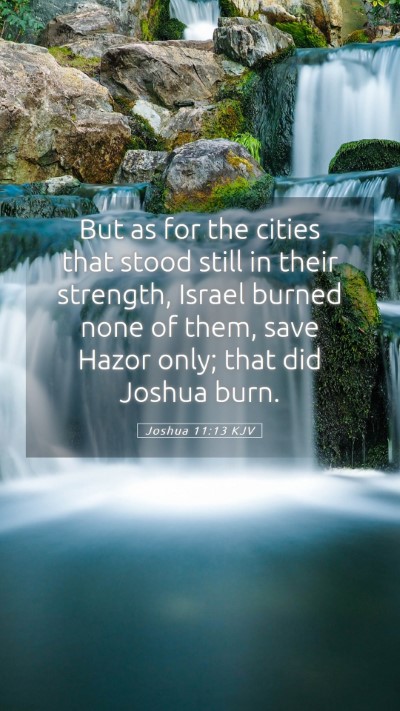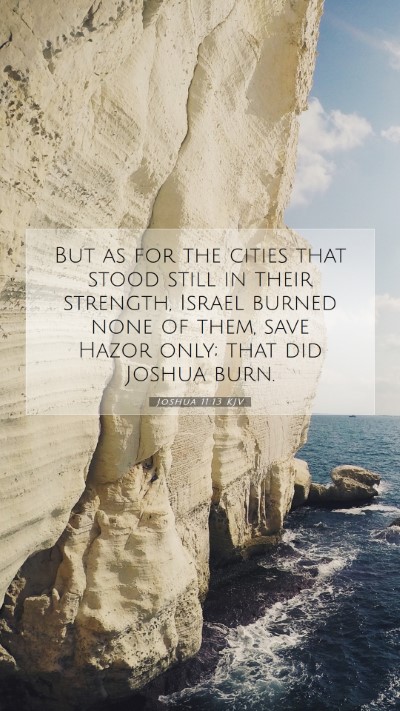Old Testament
Genesis Exodus Leviticus Numbers Deuteronomy Joshua Judges Ruth 1 Samuel 2 Samuel 1 Kings 2 Kings 1 Chronicles 2 Chronicles Ezra Nehemiah Esther Job Psalms Proverbs Ecclesiastes Song of Solomon Isaiah Jeremiah Lamentations Ezekiel Daniel Hosea Joel Amos Obadiah Jonah Micah Nahum Habakkuk Zephaniah Haggai Zechariah MalachiJoshua 11:13 Meaning
What is the meaning of Joshua 11:13?
But as for the cities that stood still in their strength, Israel burned none of them, save Hazor only; that did Joshua burn.
Joshua 11:13 Bible Verse Meaning
Understanding Joshua 11:13 - A Deep Dive into Scripture
Bible Verse: Joshua 11:13 - "But as for the cities that stood still in their strength, Israel burned none of them, save Hazor only; that did Joshua burn."
Overview: Joshua 11:13 highlights an important aspect of the conquest of Canaan, focusing specifically on the cities that the Israelites did not destroy. This verse serves as both a historical account and a theological insight into the nature of God's promises and the strategy exerted by Joshua and the Israelites during their campaign.
Bible Verse Meanings
In this context, we uncover various Bible verse meanings derived from the text, emphasizing Israel's military strategy under divine guidance. The burning of Hazor is particularly significant, as it was one of the largest and most fortified cities of the region. This act of destruction signifies God's judgment against wickedness and a manner of purging the land from idolatry.
Bible Verse Interpretations
Various Bible verse interpretations provide insight into the relationship between divine will and human action. The choice to spare certain cities implies a strategic decision influenced by the strength and strategic value of other cities. Matthew Henry notes that this decision also indicates God's grace towards those cities that were not directly associated with idolatry and wickedness.
Bible Study Insights
From a Bible study insight perspective, the verse encourages deeper reflection on the themes of judgment and mercy intertwined in Scripture. The act of sparing some cities while burning others gives us a profound understanding of God’s grace amidst judgment.
Historical Context
Understanding the historical context of this passage is crucial for Biblical exegesis. It provides clarity on the period of conquest, highlighting the intense warfare faced by the Israelites. Online Bible study resources can further illuminate these battles, helping us understand the logistics and divine direction in these historical events.
Significance of Hazor's Destruction
Hazor, being burned, stands as a prime example of God's covenantal faithfulness. Its significance can extend past mere physical destruction. According to Matthew Henry's commentary, this act symbolizes the ultimate triumph of God's purposes and the eradication of influences that oppose covenant living.
Application of Joshua 11:13
When applying this Bible verse to daily life, we can reflect on the balance between judgment and mercy in our lives today. Just as the Israelites faced choices in their conquests, we too face daily decisions on what we choose to engage with or retract from.
Bible Cross References
- Deuteronomy 7:2 - Command to destroy the nations.
- Joshua 10:28-39 - Further accounts of cities conquered and destroyed.
- Judges 4:2 - The continued threat of Canaanite cities.
Conclusion
Joshua 11:13 serves as a profound Scripture that encapsulates divine purpose in militaristic endeavors while challenging us to reflect on our own actions and decisions within our communities regarding judgment, mercy, and choosing our battles wisely. For those involved in Bible study groups or seeking Bible study materials, this verse offers rich content for discussion. It leads us to ponder not just historical battles but our everyday spiritual warfare against sin and idolatry.


